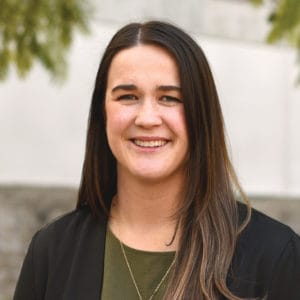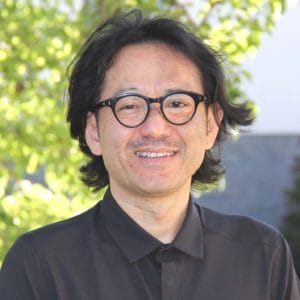Faculty
-

Jessica Clague DeHart
Associate Professor of Community and Global Health
Research Interests
Epidemiology, chronic disease, cancer etiology, cancer survivorship, molecular and genetic epidemiology, lifestyle intervention trials, exercise, nutrition, quality of life, community-based interventions
-

Stewart I. Donaldson
Distinguished University Professor
Executive Director, Claremont Evaluation Center
Executive Director, The Evaluators' Institute (TEI)
Research Interests
Positive Organizational Psychology, Health/Well-Being & Positive Functioning Across Cultures, Program Design & Re-Design, Culturally Responsive Theory-Driven Measurement & Evaluation
-

Jamie Felicitas-Perkins
Assistant Professor of Practice of Community and Global Health,
Director of the Doctor of Public Health (DrPH) programResearch Interests
Determinants of health among racially/ethnically diverse, underserved, and underrepresented populations; health disparities among Asian Americans, Native Hawaiians, and Pacific Islanders; cancer disparities and contributing factors; cancer prevention; tobacco control and prevention; tobacco-related disparities; and community-based participatory research
-

Bree Hemingway
Assistant Clinical Professor of Community and Global Health,
Associate Director of the Master of Public Health (MPH) program,
Co-director of the Doctor of Osteopathic Medicine (DO)/MPH dual programResearch Interests
Program evaluation, health disparities, and public health workforce development
-

C. Anderson Johnson
Professor
Founding Dean, School of Community & Global HealthResearch Interests
Transnational prevention of tobacco, alcohol, and drug abuse, HIV-AIDS, and obesity; Community-based substance abuse prevention; Social and environmental influences on health; Community and mass media approaches to health
-

Rachaline Napier
Clinical Associate Professor of Community and Global Health
Research Interests
Global Health, Epidemiology
-

Paula Healani Palmer
Associate Professor of Community and Global Health
Director of the PhD in Health Promotion Sciences programResearch Interests
Determinants of health among ethnically diverse populations; Community-based participatory research among under-served, underrepresented populations; Health of Pacific Islanders and South Asians; Technology applications for health behavior interventions; Tobacco control, mental health, disaster management, health of migrants and indigenous peoples; Maternal and child health
-

Darleen V. Peterson
Professor of Practice, Community and Global Health
Senior Associate Dean for Academic Affairs
Director of the Certificate and Master of Public Health (MPH) programsResearch Interests
Evaluation of Health Communication Campaigns, Effects of Pro- and Anti-Tobacco and Alcohol Marketing; Public Health Education Accreditation
-

Kim D. Reynolds
Professor
Research Interests
Nutrition and physical activity, Health promotion and disease prevention, Diabetes and obesity
-

Yusuke Shono
Assistant Professor of Community and Global Health
Research Interests
Application of theories and models of cognitive processes; Implicit cognition and health behavior; Cognitive screening and assessment; Measurement of health disparities and inequity; Measurement and validation in cognitive, behavioral, and health outcome assessment
-

Alan Stacy
Professor
Associate Dean for Faculty AffairsResearch Interests
Application of theories and methods of human memory; Cognitive neuroscience and social cognition to health behavior: etiology, prevention, and media effects; Translation of basic research to field research, high-risk populations, and prevention; Validation issues in assessment
-

Bin Xie
Professor of Community and Global Health
Director of the Applied Biostatistics (MS) programResearch Interests
Obesity prevention; Tobacco control; Diet, physical activity, body image in adolescents; Psychological adjustment to obesity; Diabetes and cancer; Application of statistical analysis in prevention research
Curriculum
Core Courses
Theoretical Foundations in Health Education & Promotion
Biostatistics
Epidemiology
Health Services in the US and Abroad
Environmental & Occupational Health
Seminar in Grant Writing & Proposal Development
Foundations of Global Health: An Interdisciplinary Perspective
Supervised Field Training in Public Health
Public Health Capstone
Concentration Specific Courses
Foundations of Program Planning
Monitoring & Evaluation of Global Public Health Programs
Curriculum & Materials Development
Campaigning & Community Organizing for Public Health
Data Analysis (SAS)
Research Methods in Public Health
Emerging Chronic & Infectious Diseases Worldwide
Applied Geospatial Epidemiology
Public Health Leadership for the 21st Century
Ethics, Human Rights & Cultural Diversity
Management of International Health Programs & Organizations
Health Advocacy
The Community Translational Research Institute (CTRI)
The Community Translational Research Institute (CTRI) was created in 2014 by Claremont Graduate University faculty and local government and healthcare leaders to link community-based healthcare, social service, and governmental organizations with local colleges and universities to develop and assess novel approaches to disease prevention and health promotion at the community level. Programs include diabetes and other chronic disease prevention, mitigation of risk for social and emotional dysfunction, adverse childhood events and other adversities as upstream determinants of poor health and addressing the causes of health inequities. CGU students from public health, psychology, evaluation collaborate with social work, clinical psychology, medical, and nursing students from over ten area universities in community settings. Opportunities available for students include formal coursework, internships/practica, assistantships, and doctoral dissertations.
Networking Opportunities
With more than 80 chapters throughout the world, the Delta Epsilon chapter of the Delta Omega Honorary Society in Public Health at CGU opens numerous academic and professional opportunities for SCGH students, including:
- Electing students, faculty, alumni, and honorary members based on high academic standards and outstanding performance in scholarship, teaching, research, and community service.
- Connecting students to a vast networking pool of 15,000 members from the top echelons of graduate schools, programs of public health, and the public health community.
- Opening doors for faculty and students to network and positively impact public health initiatives in the Southern California region.
- Boosting students’ transition from academic life to professional life.
Application Guidelines
| Item | Description |
|---|---|
| Application Fee | $135 |
| Official Transcripts | Yes |
| Letters of Recommendation | 3 |
| Statement of Purpose | Yes |
| Resume | Yes |
| Other Requirements | English proficiency exam |
CGU operates on a priority deadline cycle. Applicants are strongly encouraged to submit complete applications by the priority dates in order to assure maximum consideration for both admission and fellowships.
Once the priority deadlines have passed, the University will continue to review applications for qualified candidates on a competitive, space-available basis. The final deadlines listed are the last date the University can accept an application in order to allow sufficient time to complete the admissions, financial aid, and other enrollment processes.
Spring 2024
Priority Deadline – November 1, 2023
Final Deadline (International) – November 15, 2023
Final Deadline (Domestic) – December 1, 2023
Classes begin – January 16, 2024
Fall 2024
Priority Deadline – February 1, 2024
Final Deadline (International) – July 5, 2024
Final Deadline (Domestic) – August 1, 2024
Classes begin – August 26, 2024
Application Checklist
Applications are accepted on a rolling basis. For priority admission and fellowship consideration, applications should be submitted by the priority deadlines.
All supporting documents should be sent to Claremont Graduate University at the following address:
CGU Office of Admissions
150 E. 10th Street
Claremont, CA 91711
Application materials, including electronic transcripts, can also be sent via email to admissions@cgu.edu.
University Application Requirements
Applicants to the Master of Public Health and Doctorate in Public Health programs in the School of Community and Global Health should apply using the SOPHAS application. SOPHAS is a service of the Association of Schools and Programs of Public Health, which represents the CEPH-accredited schools and programs of public health. You will not be required to submit an additional application to CGU directly; submission through the SOPHAS portal is all that is required.
The application fee is non-refundable.
Applicants must submit a sealed, official transcript from every undergraduate and graduate institution that has granted the applicant a degree. Electronic transcripts sent to admissions@cgu.edu are also accepted. For undergraduate coursework, applicants are required to submit proof of a completed bachelor’s degree from a regionally accredited college or university.
Applicants currently earning a degree that will be completed prior to attending CGU are required to submit a transcript showing work in progress for evaluation purposes. Once the degree has been granted, a final official transcript documenting the degree conferred must be submitted to CGU.
International applicants are advised to review the International Transcript Guidelines for additional information on submitting international transcripts.
Applicants must submit a copy of their resume.
A valid score on one of the following examinations TOEFL, IELTS, Pearson PTE scores is required of all non-native English speaking applicants. The examination is not required for the following applicants:
- Citizens or permanent residents of countries where English is the sole official language of instruction, e.g., Australia, Bahamas, Barbados, Canada (except Quebec), England, Ghana, Ireland, Jamaica, Kenya, New Zealand, Nigeria, Scotland, St. Vincent and the Grenadines, Trinidad, Tobago, Uganda, and Wales (see the CGU Bulletin for a complete list of accepted countries).
- Applicants who hold an undergraduate or advanced degree, or will have earned such a degree prior to enrolling at CGU, from an institution in the US or in countries where English is the sole official language of instruction (see above).
- Applicants who have successfully completed an academic English pre-master’s or intensive graduate bridge program from a nationally recognized, regionally accredited four-year college or university in the United States in the last two years, with submitted evidence of successful completion, and subject to curriculum approval.
CGU’s school code for the TOEFL exam is 4053.
International applicants are encourage to visit our International Applicants page for more information, including score requirements.
When filling out the online application, please enter references acquainted with your potential for success who will submit a written recommendation on your behalf. In most academic departments, references from faculty members who can speak to your academic ability are preferred; applicants with substantial work experience may request professional references. Please do not enter family members as references.
You will be required to input information for your recommenders (whether they are submitting online or not) in the “Recommendations” section of the online application. Please follow the directions in this section carefully before clicking on “Recommendation Provider List” to input the names and contact information for each recommender. You will have an opportunity to indicate if the reference writer will be submitting online. These reference writers will receive an email from CGU with instructions on submitting an online recommendation.
Recommenders who are indicated as offline will not receive an email from CGU with instructions to submit. These reference writers can submit via traditional mail and should use the supplemental New Student Recommendation Form. Recommenders can also email their letter of recommendation to the Office of Admissions at admissions@cgu.edu.
Please submit a 2-3 page statement of purpose that details your academic and/or professional achievements, your specific areas of research interest within your desired field of study, why you are a strong candidate for graduate studies at CGU, and your career goals.
Cost & Aid
ESTIMATED TUITION (CALIFORNIA RESIDENTS, NON-RESIDENTS, INTERNATIONAL)
| Program | 44 units (students can transfer up to 6 units) |
| Tuition per unit* | $2,020 |
*Based on 2023-2024 tuition rates.
STUDENT FEES (PER SEMESTER)
| $245 Student Fee |
| $150 Technology Fee |
| International Student Services Fee*: $661 fall semester, $776 spring semester **Applies to all international students (F-1 visa only) who are registered in coursework, doctoral study, or continuous registration. The fee is assessed each fall and spring semester for annual ISO accident and sickness plans and administrative fees. Subject to change. |
For estimates of room & board, books, etc., please download CGU’s Cost of Attendance 2022-2023 .